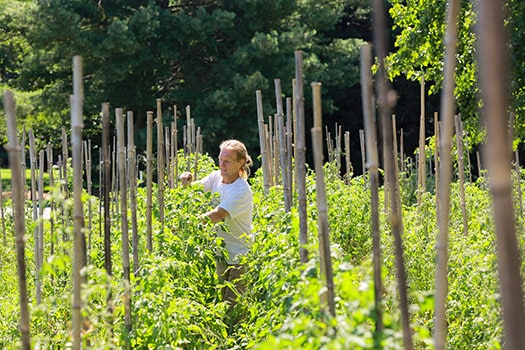Paul Callahan and the little farm that could
By Samantha Wagner
This article appeared originally in the Fall 2018 issue of Frontiers Magazine.

SMC alum Paul Callahan ’94 never wanted to be a farmer. An Ohioan by birth and a South Carolinian since college, he dreamed of playing soccer for a Division I school. While D1 didn’t work out, his experiences brought him to Spartanburg Methodist College, where his work-study program led him to the soccer team. At school he found a place where a young man intent on athletics could begin to thrive in the world of academia. “It was a place that taught me how to study and gave me individualized attention,” Callahan says. “I was a kid who struggled with school, and SMC helped me focus and learn, while ultimately giving me the foundation to move on.”
Encouraged by professors, Callahan graduated from SMC and then the College of Charleston with a B.A. in Political Science. Far from his soccer days, his adult life led him to policy work in Washington, D.C. It was there, in a city of brick, mortar, and concrete, far from the green fields of a sports complex or the rich earth of South Carolina and Ohio, that the farming life found him.
His wife was the first to convert to shopping at the local farmers market. “At the time,” Callahan says ruefully. “I had no interest in farming outside of the paperwork I did for Congressman Joe Wilson regarding agribusiness policy.” That reality changed, however, when a fateful business trip took him to a South Carolina farm for a week of tours and education.
In his own words, it was a “life-changing event” that moved his heart and mind from the office into the field. After returning from his trip, Callahan began looking for ways to make farming his full-time reality. He contacted farmers from the Shenandoah region in Virginia to the state of South Carolina asking about job opportunities and offering his unique skill set. In an economy still hurting from the recession of 2007-2009, however, no one needed help and no one believed he was serious about changing his career.
Determined, Callahan ran the numbers and came up with a gutsy plan. “I came home one night and asked my wife, ‘What if we did it? What if we returned to South Carolina, bought land, and started our own farm?’”
She agreed, and they did, by purchasing acreage in Duncan, South Carolina — a place familiar to both of them and close to their families. They named their farm the Harp & Shamrock Croft.
“Farming is not a part-time job, it’s a full-time job,” Callahan says. “Harvest days take all day, and then you’re still staking tomatoes and caring for the animals when the sun has set.” Those early years were hard, requiring much effort as even the land proved a challenge. “This is not the right land,” Paul comments. “We didn’t know that at the time, but now we understand. There are too many trees, too much shade, and not enough room to expand.”
Still, these natural challenges did not deter the family. Instead they prompted creative thinking, efficient planning, and improvisation. Callahan and wife, Jenni’s, dedication and focus soon reaped rewards as the Harp & Shamrock Croft became a regular offering at local farmers markets and interest in the farm’s offerings began to grow.
Now, five years past its inception, the Harp & Shamrock Croft has a reputation for high-intensity farming. It produces approximately 5,000 pounds of produce annually on 1 acre of land. Every inch of space is used efficiently to maximize the potential of the land to produce. Chickens roam in large open pens, and beans, cucumbers, tomatoes, and squash grow in healthy garden plots. In the middle of May, the greenhouses are transitioning from winter kale and leafy greens to the plants of summer. Everywhere there is green growth, and evidence of the hard work and determination of a farmer and his family.
The farm now serves two main purposes. The first is a source of income and vocation. The second is a way to educate others about localism, farm-to-table living, and the wonders of a small-business economy. It seems that spirit of learning Callahan gained at SMC continues to thrive. He and his family of seven welcome visitors to their farm eagerly. They enjoy sharing the story of the little farm that could, while also encouraging shoppers to support local farms.
Ironically, interest in local produce has seasons. “Traffic is great in summer but dies away when school starts. Perhaps because people don’t know about winter garden offerings or they just get busy,” Callahan says. Many times shoppers are unaware of what items are naturally in season. Part of his job is educating shoppers about the produce they purchase and the specifics of natural farming. Many customers offer to volunteer during harvest times, and Callahan’s intro to gardening classes capture the attention of would-be gardeners looking to start their own patch of paradise. “I say go big or go home,” Callahan laughs. “If you want to go for something, then go for it with all you have.”
That same spirit of daring and dreaming is taught to every visitor to the farm and every curious new-garden beginner. Callahan’s ever-watchful, ever-curious children also learn lessons through living on a farm, including biology, business, economy, and the power of “sweat equity.” Even Callahan himself never stops learning. “My background is in criminal justice and political science, not biology,” he says. “We learned when we first started from books, videos, and other farmers.”
At the very beginning one sage farmer commented, “Try everything, but not all at once.” The Callahans have taken this advice to heart. From crop rotations to gravity-fed water lines, Callahan and his family continue to do just that.
